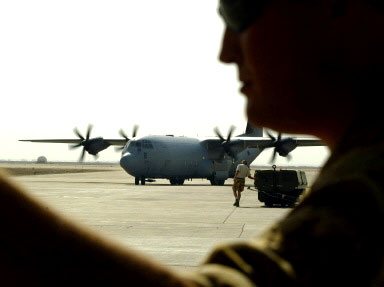
Britain investigates crash of Royal Air Force C-130 Hercules in northwest of Baghdad that killed around 10.
BAGHDAD - Investigators were due Monday at the site of the crash of a British military transport plane northwest of Baghdad that killed around 10 personnel, Britain's biggest single loss since the invasion of Iraq.
A military expert quoted on BBC radio in Britain said it was possible the Royal Air Force C-130 Hercules could have been shot down, but the British defense ministry refused to speculate on the cause of Sunday's crash.
"Clearly there will be a very thorough investigation into exactly what happened," a ministry spokesman in London said on condition he not be named.
"We will have people on the ground today examining the crash site to see what evidence they can gather which can be fed into this investigation," the spokesman said.
"We had US and UK forces on site yesterday" to help examine the site, he added.
The ministry also declined to comment on reports in the Daily Telegraph and Daily Mirror that members of Britain's elite Special Air Service (SAS) were aboard the flight.
"We simply do not comment on special forces operations," he added.
Britain's domestic Press Association newswire quoted military sources in Iraq as saying the transport plane rarely travels north of Baghdad.
The sources said the aircraft was primarily used to ferry troops from the British sector headquarters in Basra, the main southern city, to the capital.
According to the Royal Air Force website, the Hercules is used primarily to carry troops, passengers and freight.
The ministry spokesman also said next of kin had to be notified before he could comment on Australian foreign ministry remarks that a Royal Air Force navigator having dual Australian-British nationality might have been aboard.
British military sources estimated that about 10 people perished in the crash, saying it was highly unlikely the toll was above 15 dead and expected to have a clearer toll later Monday.
The transport plane went down northwest of Baghdad at 4:40 pm (1340 GMT), according to the coalition military press office in Baghdad, with wreckage scattered over a large area.
An officer with the US-led military coalition in Baghdad, speaking on condition of anonymity, said the plane had been heading to Balad, which lies 70 kilometers (40 miles) north of Baghdad.
Balad houses one of the largest US airbases in Iraq and has two runways, according to Britain's Press Association newswire. Its 25-square-kilometre (10-square-mile) airfield is protected by a 20-kilometre (eight-square-mile) security perimeter.
The crash, which occurred during a spate of attacks aimed at sabotaging the first democratic elections in Iraq for 50 years, could have been caused by "hostile action," said Air Vice-Marshall Tony Mason, a military expert.
"On the face of it we have a fully-serviceable aircraft, we have an extremely competent crew, we have the potential indicator that the first statement said the crash site covered a wide area, which suggests impact in the air rather than the ground," Mason said.
Speaking on the BBC Radio 4 Today programme, he added the transport plane was very secure and reliable and that the Balad base was regarded by US troops as very dangerous to fly in to or out of.
He said he doubted it was a regular run for the crew.
He added: "We don't know the composition of the nine people.
"It could have been Army and Air Force or it could have been an entire RAF crew from Lyneham.
"It could have been SAS, it could have been any combination of troops. If it is SAS of course we shall probably never know because the Ministry of Defence regards movements of the SAS as very, very highly classified."
British Foreign Secretary Jack Straw told the BBC on Monday that the crash resulted in "the largest single loss of British service lives" since Britain joined the US-led invasion of Iraq nearly two years ago.
"Our hearts go out to the family and comrades of those who were killed and injured," Straw said. "Theses were very brave men as all those who have been killed or injured over the last two years."
The previous largest single loss of British lives was eight soldiers killed in a helicopter accident on March 21, 2003. Prior to the crash 76 British troops had lost their lives in Iraq in combat or accidents.
Prime Minister Tony Blair said Sunday "this country and the wider world will never forget them."
Britain currently has about 7,500 troops in Iraq.









0 Comments:
Post a Comment
<< Home